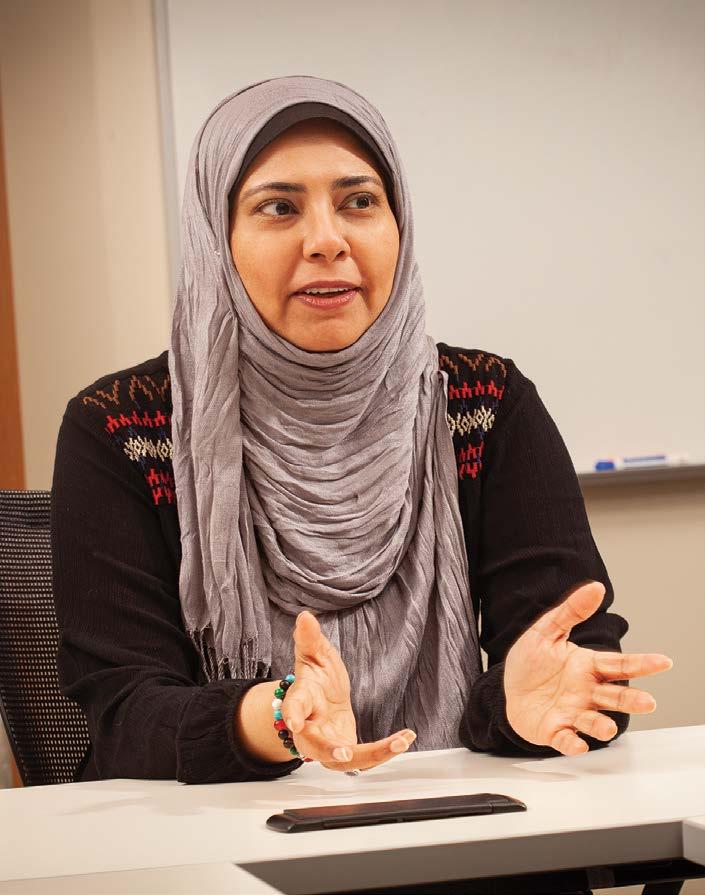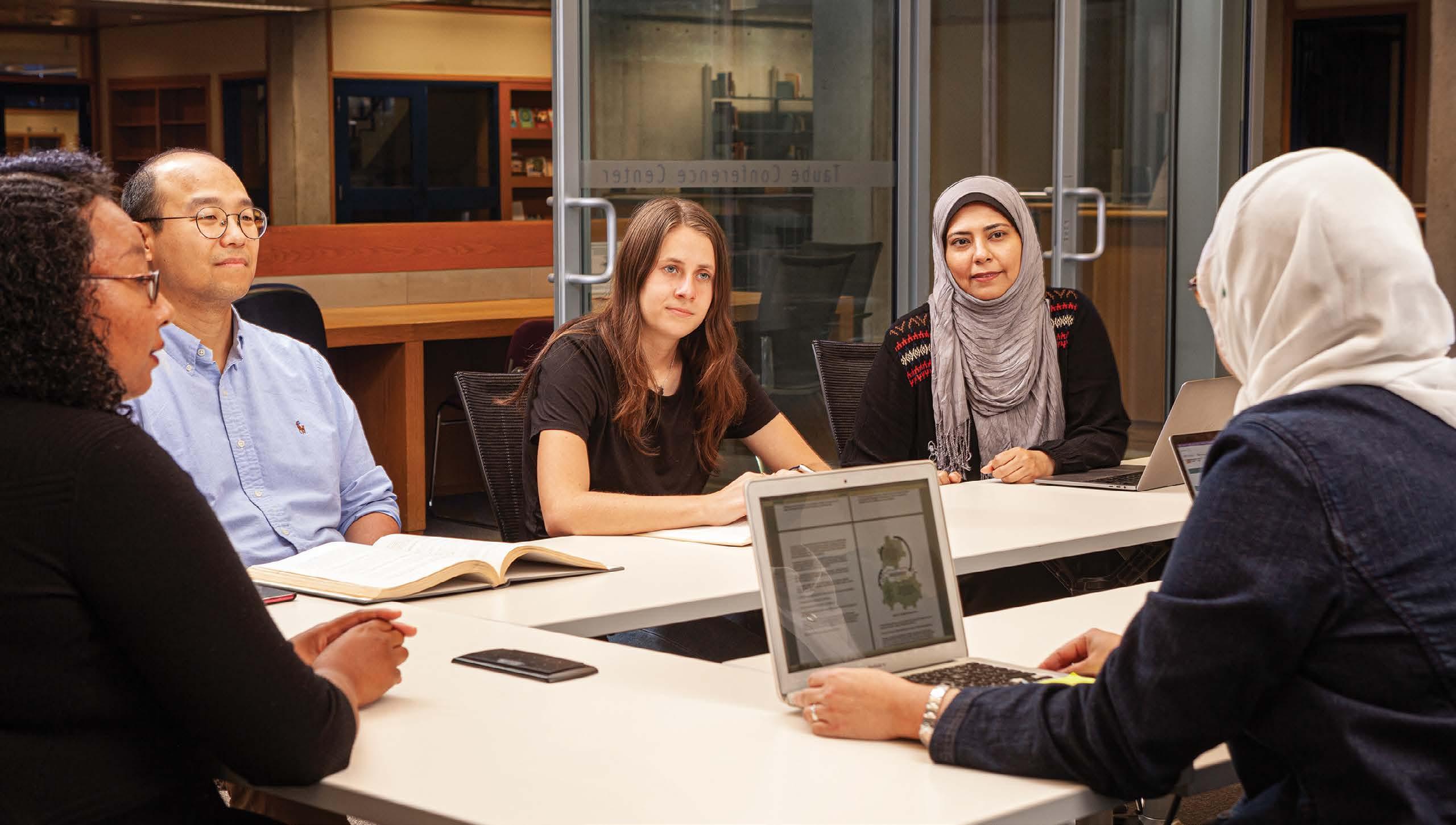
5 minute read
Madrasa-Midrasha : The Dialogue of Interreligious Understanding & Exploration
The Dialogue of Interreligious UNDERSTANDING & EXPLORATION
An interview with Dr. Mahjabeen Dhala
In a recent interview with the GTU, Dr. Mahjabeen Dhala, who began her position as Assistant Professor of Islamic Studies and Director of the
Madrasa-Midrasha (MM) Program at the GTU earlier this year, paints a vivid portrait of the work of Madrasa-Midrasha, how it aligns with the GTU’s mission, and shares her hopes for the program’s future.
What do “Madrasa” and “Midrasha” mean? How does the meaning of these terms and their juxtaposition help elucidate the mission of this initiative?
The Arabic word madrasa (ةسرده) refers to any type of educational institution, secular or religious, whether for elementary instruction or higher learning. The word derives from the tri-consonantal
Semitic root د-س-ر (D-R-S), meaning
“to learn or study.” The modern Hebrew word midrasha (השרדמ) refers to a place of Jewish learning. It grew out of the words beit midrash, an ancient rabbinic term that means house of study. The
Hebrew root of midrasha refers to the process of inquiring into sacred texts to derive meaning.
Both terms convey a sense of critical study and passionate learning along with care and concern for the subject of study, the place of study, and all parties involved in the process of study. Their combination embraces learning as sacred and transformative. These terms capture the mission of the program: to advance study, dialogue, and understanding on Jewish and Islamic texts and contexts within academia and the larger public.
— Dr. Mahjabeen Dhala What are the origins of MadrasaMidrasha? What enabled this program to launch? The Madrasa-Midrasha program was founded in 2008 as a collaborative effort between the Richard S. Dinner Center for Jewish Studies and the Center for Islamic Studies to explore the richness, diversity, differences, and commonalities of Jewish and Islamic traditions. Over the years, the program has flourished under the dedicated leadership of Dr. Deena Aranoff, Dr. Munir Jiwa, and Dr. Naomi Seidman. How does Madrasa-Midrasha serve as an exemplar of our institutional commitment to fostering interreligious dialogue? As an academic institution of higher education and as a consortium of member schools, the GTU offers a unique opportunity to bring together critical academic methods with diverse faith perspectives to advance interdisciplinary research. The GTU’s commitment to interreligious dialogue is evident in the diversity of the course offerings, focus on interreligious course curriculum, the Interreligious Studies Certificate, and the Interreligious Chaplaincy Program. The annual MM spring courses model an interreligious curriculum and class dynamic. Through its public-engaging programs, diverse faith communities and secular communities engage in dialogue around shared themes. What work is Madrasa-Midrasha currently doing that you would like others to know about? Currently, the program facilitates

The Madrasa-Midrasha program uniquely reflects the GTU's core commitments, offering broadened perspectives through interreligious courses, events, and program offerings. Photos: Benjamin Heller
interreligious understanding and exploration through four initiatives: (1) Course Offerings: MM offers a course every spring semester, which is open to all students. Last spring, I co-taught an online course titled “Women and Gender in Jewish and Islamic Texts and Practices” with Dr. Naomi Seidman, who is presently the Chancellor Jackman Professor in the Arts at the University of Toronto, and who has previously served as director of the MM program. I am excited to teach the next MM course in the spring of 2022, which will explore “Theories and Practices of Justice in/and Religion.” (2) Student Summer Research Grants: With the generous support of the Walter and Elise Haas Fund, we are able to offer student grants to encourage interdisciplinary and collaborative research. Last summer six students received grants that facilitated their research on Jewish and Islamic sacred texts, chaplaincy, and fashion, as well as Islamophobia and narratives of racial othering. (3) Developing Academic Partnerships: Under the leadership of Dr. Deena Aranoff and Dr. Munir Jiwa, the MM program hosts faculty colloquia, bringing together colleagues from UC Berkeley and the GTU from a range of academic disciplines in Jewish studies and Islamic studies to engage in discussions around their academic research and comparative pedagogy across the two traditions. (4) Public Programs: Besides engaging with academic scholars and students, the MM program also engages communities of multi-faith affiliations in conversations around sacred texts, rituals, spirituality, mysticism, art, religious education, culture, anti-Semitism, Islamophobia, and other related themes. How has the Walter & Elise Haas Fund helped Madrasa-Midrasha advance its mission? What existing initiatives or new initiatives are being funded by this grant? Through their generous support, the Walter and Elise Haas Fund continues to facilitate the MM spring courses, the public programs, the GTU-UCB faculty colloquia, and the student research grants for collaborative research. We are working toward the possibility of offering intersession and summer programs that are both academic and for the wider public. What are your hopes for the future of the Madrasa-Midrasha program? Since 2008, the MM program has demonstrated leadership in effectively bringing together Jewish, Muslim, and other communities in deeper conversations around shared sacred, moral, social, cultural, and academic understandings. With my background in Theology and Women’s Studies in Religion, I am keen to explore how the MM program could lead, facilitate, and advance research and dialogue on women’s contributions to religious education and leadership from an interreligious perspective. What do you find most fulfilling about working with the Madrasa-Midrasha program? What have you learned in this work? It is most gratifying to offer students resources that widen their interreligious and interdisciplinary perspectives through courses and grants. Through my work with the MM program at the GTU, I have learnt that when the going gets tough, the tough meet the moment with passion, compassion, and faith to offer knowledge, hope, and support for a better and more just world.










